#Behavioral Health Assessment
Link
Individual Counseling is a convenient and affordable way to improve your mental health. We provide confidential counseling services with a licensed mental health practitioner. Visit - https://www.nakunion.org/counseling/
#Behavioral Health Assessment#Behavioral Health Services Georgia#Individual Counseling#Substance Abuse Treatment Georgia#Mental Health Evaluation Assessment#Counseling Programs Georgia#Mental Health Evaluation Online#Professional Environment Georgia#Mental Health Evaluation Georgia#Therapist in Atlanta#Psychiatric Services Atlanta GA#Atlanta Psychiatry Services
0 notes
Text

flat fuck friday came early
#look at this fucking thing. hes going up for adoption as soon as he clears behavioral and health assessments#dunsparce#pkmn irl
48 notes
·
View notes
Text
best thing about this damn ass masters degree is that i can write my thesis on queer women i couldnt be happier tbh
#we'll assess body image components eating behavior and some other variables e.g. community involvement#and im gonna focus on comparing lesbian bi and het women yay#mayb all of this is worth it if i can do research to improve mental health care for queer women#meeting took three hours again tho and i got a new deadline thats gonna eat me alive so theres that also#im tired
5 notes
·
View notes
Text
.
#tfw your new healthcare calls and does the little health assessment checklist#and then the girl gets to the end of her questions and goes#uhhh i'm gonna pass you to a behavioral health nurse ok?#so that was a hoot lol#but now I get to cross check like three lists of therapists#dear god send more coffee
9 notes
·
View notes
Text
Mental Health Services Ontario
Mental Health Services Ontario is dedicated to providing accessible and comprehensive mental health support to individuals across the province. Our team of experienced professionals offers a wide range of services, including counseling, therapy, and psychiatric support. We are committed to helping you navigate life's challenges and improve your overall well-being. Reach out to us today for support and guidance.
#ADHD assessment Ontario#Mental Health Services Ontario#Cognitive Behavioral Therapy Online#Cognitive Behavioral Therapy Ontario#Christian Counselling Ontario#Mental Health Ontario#psychologists Ontario
0 notes
Text
#Weight Loss Program#Nutrition Counseling#Personal Training#Fitness Classes#Meal Planning#Wellness Coaching#Dietitian Consultation#Body Composition Analysis#Health Assessment#Exercise Physiology#Meal Replacement Shakes#Yoga Classes#Meditation Sessions#Cardio Workouts#Strength Training#Group Fitness#Nutritional Supplements#Meal Delivery Service#Health Education Workshops#Stress Management#Lifestyle Coaching#Behavior Modification#Mindfulness Practices#Wellness Retreats#Detox Programs#Holistic Healing#Spa Treatments#Medical Weight Loss#Meal Prep Services
0 notes
Text
Transforming Telehealth: How AI-Powered Virtual Consultations and Remote Monitoring Are Shaping the Future of Healthcare
New Post has been published on https://thedigitalinsider.com/transforming-telehealth-how-ai-powered-virtual-consultations-and-remote-monitoring-are-shaping-the-future-of-healthcare/
Transforming Telehealth: How AI-Powered Virtual Consultations and Remote Monitoring Are Shaping the Future of Healthcare
As technology reshapes various industries, healthcare is undergoing some of the most significant transformations. Originally developed to monitor astronauts’ health in space, telehealth has emerged as a crucial healthcare tool, particularly during the COVID-19 pandemic. This development has now entered a new phase with the integration of Artificial Intelligence (AI). AI-powered virtual consultations and remote monitoring are increasingly becoming essential, effectively closing the gap between doctors and patients. This article explores how the integration of AI and telehealth is ushering in a new era of medical practices, transforming accessibility and efficiency of healthcare delivery.
What is Telehealth?
Telehealth refers to the delivery of healthcare services and information via telecommunications and digital communication technologies. This method allows patients to access medical care remotely, eliminating the need for in-person visits to a doctor’s office or hospital. Telehealth encompasses a broad range of services including virtual medical consultations, health education, remote monitoring of vital signs, and the transmission of medical imaging and health data. The primary goal of telehealth is to make healthcare more accessible, particularly for those in remote or underserved areas, and to enhance the convenience and efficiency of care management for both patients and providers.
The Evolution of Telehealth
Telehealth is not new; it began in the early 20th century with the use of radio and telephone to reach remote patients. The introduction of television and later the internet expanded its capabilities, incorporating video calls for consultations and more robust digital communication platforms. The COVID-19 pandemic significantly accelerated telehealth adoption, making it essential for managing non-emergency consultations safely. With recent AI integrations, telehealth has transitioned from a simple communication tool to a sophisticated platform capable of delivering personalized healthcare services.
AI-Powered Virtual Consultations and Remote Monitoring
Artificial Intelligence (AI) is transforming telehealth by enhancing its efficiency, accessibility, and personalization. AI-driven telehealth platforms, employing tools like chatbots, autonomously handle patient interactions, schedule appointments, and deliver medical information. Advanced AI algorithms are used to analyze comprehensive patient data, predict health outcomes, and notify healthcare providers of critical changes in a patient’s condition, enabling prompt medical responses. Here are some examples of widely used AI-powered telehealth systems:
Ada Health: This AI-chatbot offers personalized health assessments and guides users to appropriate medical care levels. Ada employs sophisticated AI techniques, such as probabilistic reasoning and Bayesian methods, to simplify and accelerate the diagnostic process. It enables precise symptom assessment against a database containing 3,600 conditions and over 31,000 ICD-10 codes, encompassing 99.5% of all diagnosable conditions. With more than 13 million global users, Ada Health exemplifies transparent, explainable AI in healthcare, providing clear insights into the diagnostic process.
OneRemission: This application is designed to support cancer survivors, fighters, and their supporters. It features an AI-powered chatbot that offers round-the-clock support, handling inquiries about cancer care and post-treatment lifestyle practices. Using cutting-edge AI technologies like natural language processing and machine learning, the chatbot quickly delivers information on nutrition, exercise, and stress management, and can escalate concerns to healthcare professionals as needed.
Teladoc Health: This platform leverages AI to optimize telehealth appointment scheduling and enhance patient outcomes by facilitating connections between patients and doctors. It functions across various technologies, including mobile devices, the internet, and video and phone communications. The services provided span a broad spectrum of medical needs, from common ailments such as flu and respiratory infections to more severe, chronic conditions like cancer and congestive heart failure
Babylon Health: Babylon offers a wide range of healthcare services via its AI-driven app, from assessing symptoms to conducting full virtual consultations. The app allows users to connect with doctors, nurses, and other healthcare professionals via phone or video calls. The app employs AI to track user behavior, which supports the early detection of health issues and enables timely preventive measures to enhance overall health.
Biofourmis: This telehealth platform enhances healthcare delivery with its AI-driven analytics engine, Biovitals, that monitors real-time biomarkers. It allows for the early detection of changes in vital signs, promoting proactive healthcare interventions. It processes continuous physiological data, creating a personalized biometric signature for each patient. The system has successfully predicted heart failure decompensation up to 12 days in advance, improving patient care and bringing hospital-level services and clinical trials directly to patients’ homes.
Advantages of AI in Telehealth
The integration of AI into telehealth is bridging the gap between patients and healthcare providers, offering significant advantages that promise to reshape the future of medical practice. Some of the advantages include:
Enhanced Quality of Consultations: AI provides personalized, efficient, and consistent medical advice, improving the accuracy of treatments and reducing variability in care.
Predictive Insights: AI’s ability to process large datasets enables it to anticipate disease progression, identify high-risk patients, and recommend preventative measures. Systems like Biofourmis’ Biovitals Analytics Engine process physiological data to predict events like heart failure decompensation days in advance, allowing for early intervention and potentially preventing hospital admissions.
Improved Patient Engagement and Education: AI-driven chatbots and virtual assistants, such as Ada Health and OneRemission, interact with patients to provide health education, answer queries, and guide them through their healthcare journey. This not only enhances patient knowledge and engagement but also ensures that patients receive consistent support and guidance.
Operational Efficiency in Healthcare Delivery: By automating routine tasks such as scheduling appointments and processing patient inquiries, AI allows healthcare facilities to optimize their operations and focus more resources on critical care activities. This efficiency gain reduces overhead costs and improves service delivery.
The Bottom Line
The integration of Artificial Intelligence (AI) with telehealth is transforming healthcare by enhancing accessibility, efficiency, and personalization. AI-powered systems, such as Ada Health, OneRemission, Teladoc Health, Babylon Health, and Biofourmis, are transforming how healthcare is delivered by providing advanced diagnostics, personalized consultations, and continuous remote monitoring. This integration not only improves the quality of healthcare consultations but also enables predictive insights that can anticipate disease progression and mitigate risks, thereby increasing operational efficiency and reducing healthcare costs. As these technologies evolve, they promise to bridge the gap between patients and providers, making healthcare more accessible and effective, particularly for underserved population.
#000#Accessibility#Ada Health#Admissions#Advice#ai#AI in healthcare#AI-powered#Algorithms#Analytics#app#appointment scheduling#Article#artificial#Artificial Intelligence#assessment#astronauts#Babylon Health#Behavior#Biofourmis#biomarkers#biometric#bridge#Cancer#chatbot#chatbots#communication#communications#comprehensive#continuous
0 notes
Text
Website: https://www.slingshothc.com
Address: 112 Harrison Street, Frenchtown, New Jersey 08825, United States
Slingshot Health Coaching, led by Tracy Spiaggia, offers holistic mental health support focused on moms and their families. With a foundation in faith and a comprehensive approach incorporating functional nutrition, lifestyle changes, and brain health strategies, Tracy guides clients through transformative processes. Services include virtual group and individual coaching, aiming to address anxiety, depression, and overall wellness challenges. Tracy's qualifications, including certifications in Functional Nutrition and Lifestyle Practitioner, Amen Clinic Brain Health Specialist, and Integrative Nutrition Coach, bolster the personalized care provided.
Facebook: https://www.facebook.com/Slingshothc/
Pinterest: https://www.pinterest.com/slingshothc/
Keywords:
mental health coaching
personal growth coaching
personal development coaching
online mental health support
nutrition and mental health
mind body wellness
self care practices
stress reduction strategies
nutritional wellness
positive psychology coaching
emotional intelligence coaching
stress management coaching
integrative health coaching
anxiety and depression help
virtual health coaching
holistic lifestyle coaching
emotional resilience training
anxiety and depression support
whole person wellness
lifestyle transformation
integrative wellness coaching
personalized wellness programs
personal empowerment coaching
mental fitness programs
inner peace coaching
health and wellness goal setting
emotional health support
virtual group coaching
mindfulness based coaching
overcoming mental health challenges
comprehensive holistic health
holistic health strategies
mental health coaching usa
holistic health strategies online
nutritional wellness coaching
lifestyle transformation support
faith based wellness coaching
family focused mental health
brain health optimization
sustainable behavioral change
virtual health coaching services
integrative nutrition coaching
self care practices coaching
virtual group coaching online
individual health coaching services
health and lifestyle assessments
wellness and spirituality integration
nutrition and wellness coaching
transformational lifestyle coaching
anxiety and depression coaching
faith based health and wellness
family mental health coaching
brain health optimization strategies
sustainable behavior change coaching
virtual health coaching programs
integrative nutrition guidance
personalized wellness plans
goal setting for health and wellness
overcoming mental health obstacles
online group wellness coaching
individualized health coaching
spirituality and wellness coaching
virtual mental health coaching usa
faith based wellness
individual health coaching
mental well being guidance
family well being strategies
cognitive health coaching
lifestyle balance coaching
virtual holistic counseling
spiritually guided wellness
nutritional balance coaching
mindful living coaching
goal oriented wellness
wellness coaching for life changes
lifestyle optimization programs
emotional well being coaching
transformative wellness coaching
new jersey mental health coaching
holistic health strategies in frenchtown
nutritional wellness services frenchtown
lifestyle transformation coaching nj
anxiety and depression support frenchtown
faith based wellness in new jersey
family focused mental health frenchtown
brain health optimization nj
sustainable behavioral change frenchtown
virtual health coaching in new jersey
integrative nutrition coaching frenchtown
personalized wellness programs nj
stress management techniques frenchtown
health and wellness goal setting nj
overcoming mental health challenges in frenchtown
self care practices nj
wellness and spirituality integration frenchtown
nj mental well being coaching
nj holistic lifestyle coaching
mind body wellness in frenchtown
mental health coaching near me
holistic health strategies near me
nutritional wellness services near me
lifestyle transformation coaching near me
anxiety and depression support near me
faith based wellness near me
family focused mental health near me
#brain health optimization near me#sustainable behavioral change near me#virtual health coaching near me#integrative nutrition coaching near me#personalized wellness programs near me#stress management techniques near me#health and wellness goal setting near me#overcoming mental health challenges near me#self care practices near me#virtual group coaching near me#individual health coaching near me#health and lifestyle assessments near me#wellness and spirituality integration near me
1 note
·
View note
Text
The Importance Of Mental Health Evaluation In Georgia
Mental health is essential for a good and healthy life. It is not merely the absence of mental illness. Make sure you can easily cope with the challenges in life. Mental health problem includes stress, anxiety, harassment, family problems, depression, learning disability, etc. These problems can lead to major problems.
Mostly, youth are suffering from mental health issues these days. It hampers their academic and personal life effectively. It can cause major potential issues such as the risk for academic failure, social isolation, unsafe sexual behaviour, drug and alcohol abuse, suicide attempt, unemployment, and poor health
Accordingly some studies, every ten children and adolescents now have a mental illness to cause impairment. Even if they detect it earlier, they don’t get proper and timely mental health evaluation in Georgia and other help they need.
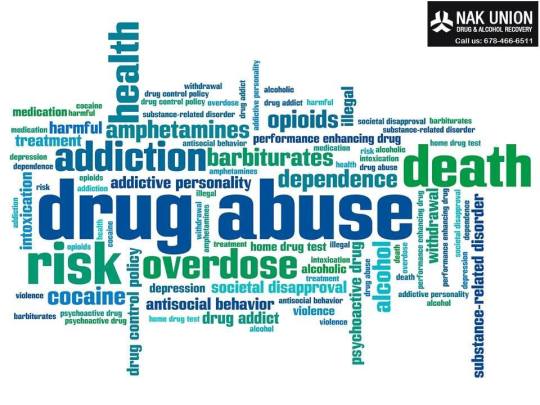
Here they need to do purposeful activities in their daily routine, be it a passion for work or any hobby or leisure activity. These are the major part of your daily routine that are purposeful, especially the work and leisure activities. You can do work for money, but it should be highly purposeful. Moreover, it will boost your confidence and self-respect so that you can lead a better life without any mental issues. When it comes to leisure activities, they can be simple as per your wish. It enhances your sense of self.
As we mentioned above mental health issues mostly affect youth these days owing to different reasons, let’s discuss some potential issues.
If you are suffering from mental health disorders, no doubt it can impact your daily routine tasks. You will feel worthless as well. The lingering process may lead to more trouble in your life and you may not get back on the right track easily.
The importance of mental health evaluation in Georgia-
Undoubtedly, mental health evaluation and counseling are highly needed for youth and children. These sorts of preventive programs can help a patient identify mental health problems earlier. It offersteaching on mental health issues, violence avoidance, social skills training, suicide prevention, and screening for emotional and behavioral problems, etc.
There are several online help available to promote mental health and many other things. You can easily access the mental health evaluation.
You must know that paying attention to the mental health issues of your children at the right time is highly important that enhances their life standard. Also, it impacts their academic and personal life achievements. They get benefits when they get identified and prevented earlier.
Mental health evaluation in Georgia offers-
It is just like a psychological assessment that is performed by a medical professional, such as a psychologist, psychiatrist, or even a family doctor. It includes various components such as verbally answering questions, Taking a physical test, and completing questionnaires, etc.
The professionals will work with you to aid you to understand and handle the symptoms that impact your life. They will tools and tests to measure and observe your behavior and accordingly, diagnose you as per the specific issues you have.
For mental health evaluation in Georgia, visit www.nakunion.org. Their Therapists are using best practices for therapeutic exercises and manual treatment procedures to boost up physical health with emotional connection.They provide physical, mental, occupational, speech, and massage therapy in the Professional Environment.

#best counseling programs in georgia#mental health evaluation in georgia#counseling programs georgia#Psychiatric& psychotherapy services in georgia#mental health evaluation assessment georgia#behavioral health services georgia#relationship counseling in georgia#Top atlanta counseling services#best therapist in Atlanta#mental health evaluation centers
1 note
·
View note
Text
Opt for the best predictive index behavioral assessment today
If you want to know what type of candidates can be a great pick for your company, you must opt for predictive index behavioral assessment. INCITE Consultancy Solutions is one of the best consultancy firms that can provide you this specific tool to better understand potential candidates for your business.
There are several business owners around the globe who use this type of assessment to understand what makes their people going. You can take the help of INCITE Consultancy Solutions to use this kind of assessment for you to understand what type of candidates can be a great fit for your company.
The best consultancy firms are known to use predictive index behavioral assessment to help clients choose ideal candidates to further their business. Contact INCITE Consultancy Services to access this tool for further growth.
Get started with INCITE Consultancy Solutions for best predictive index behavioral assessment for potential candidates!
0 notes
Text
"Research on a police diversion program implemented in 2014 shows a striking 91% reduction in in-school arrests over less than 10 years.
Across the United States, arrest rates for young people under age 18 have been declining for decades. However, the proportion of youth arrests associated with school incidents has increased.
According to the U.S. Department of Education, K–12 schools referred nearly 230,000 students to law enforcement during the school year that began in 2017. These referrals and the 54,321 reported school-based arrests that same year were mostly for minor misbehavior like marijuana possession, as opposed to more serious offenses like bringing a gun to school.
School-based arrests are one part of the school-to-prison pipeline, through which students—especially Black and Latine students and those with disabilities—are pushed out of their schools and into the legal system.
Getting caught up in the legal system has been linked to negative health, social, and academic outcomes, as well as increased risk for future arrest.
Given these negative consequences, public agencies in states like Connecticut, New York, and Pennsylvania have looked for ways to arrest fewer young people in schools. Philadelphia, in particular, has pioneered a successful effort to divert youth from the legal system.
Philadelphia Police School Diversion Program
In Philadelphia, police department leaders recognized that the city’s school district was its largest source of referrals for youth arrests. To address this issue, then–Deputy Police Commissioner Kevin Bethel developed and implemented a school-based, pre-arrest diversion initiative in partnership with the school district and the city’s department of human services. The program is called the Philadelphia Police School Diversion Program, and it officially launched in May 2014.
Mayor-elect Cherelle Parker named Bethel as her new police commissioner on Nov. 22, 2023.
Since the diversion program began, when police are called to schools in the city for offenses like marijuana possession or disorderly conduct, they cannot arrest the student involved if that student has no pending court case or history of adjudication. In juvenile court, an adjudication is similar to a conviction in criminal court.
Instead of being arrested, the diverted student remains in school, and school personnel decide how to respond to their behavior. For example, they might speak with the student, schedule a meeting with a parent, or suspend the student.
A social worker from the city also contacts the student’s family to arrange a home visit, where they assess youth and family needs. Then, the social worker makes referrals to no-cost community-based services. The student and their family choose whether to attend.
Our team—the Juvenile Justice Research and Reform Lab at Drexel University—evaluated the effectiveness of the diversion program as independent researchers not affiliated with the police department or school district. We published four research articles describing various ways the diversion program affected students, schools, and costs to the city.
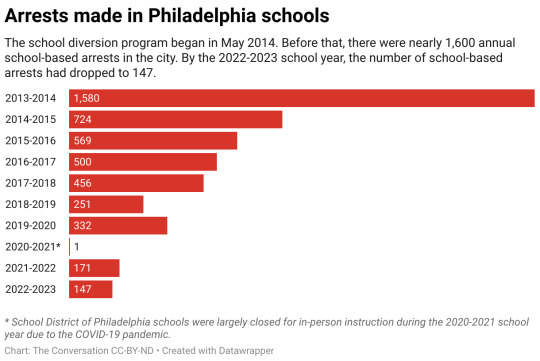
Arrests Dropped
In our evaluation of the diversion program’s first five years, we reported that the annual number of school-based arrests in Philadelphia decreased by 84%: from nearly 1,600 in the school year beginning in 2013 to just 251 arrests in the school year beginning in 2018.
Since then, school district data indicates the annual number of school-based arrests in Philadelphia has continued to decline—dropping to just 147 arrests in the school year that began in 2022. That’s a 91% reduction from the year before the program started.
We also investigated the number of serious behavioral incidents recorded in the school district in the program’s first five years. Those fell as well, suggesting that the diversion program effectively reduced school-based arrests without compromising school safety.
Additionally, data showed that city social workers successfully contacted the families of 74% of students diverted through the program during its first five years. Nearly 90% of these families accepted at least one referral to community-based programming, which includes services like academic support, job skill development, and behavioral health counseling...
Long-Term Outcomes
To evaluate a longer follow-up period, we compared the 427 students diverted in the program’s first year to the group of 531 students arrested before the program began. Results showed arrested students were significantly more likely to be arrested again in the following five years...
Finally, a cost-benefit analysis revealed that the program saves taxpayers millions of dollars.
Based on its success in Philadelphia, several other cities and counties across Pennsylvania have begun replicating the Police School Diversion Program. These efforts could further contribute to a nationwide movement to safely keep kids in their communities and out of the legal system."
-via Yes! Magazine, December 5, 2023
#philedelphia#pennsylvania#united states#us politics#school#high school#school to prison pipeline#prison system#arrests#education#students#schools#good news#hope#rare case of police not completely sucking#police#policing#law enforcement
1K notes
·
View notes
Text
.
#dude the health care system where i live for mental illness is a joke#the behavioral health center is so booked out (until december at the EARLIEST but likely march!!!!) that the nurse said my best bet was to#psych ward myself or go to my NORMAL DOCTOR to have a therapy session with her#because its THAT BOOKED OUT#by normal doctor i mean primary care like. ur normal non therapist doctor#bc she was like. not mental health professional will be able to see you in many many months so I want to make sure you can at least come in#and talk to someone who can assess your needs and make sure you get some help until then#like HUH?#i feel genuinely bad like. my dr is good with mental health but shes still a family doctor like#she has prescribed meds in the past that worked for a bit but its just like. outside of being the one to refer me to behavioral health and#generally monitoring meds she really should not be dealing with this#if i wasnt so crazy myself id want to get into behavioral health to help them out lmao#my post
0 notes
Text
Team Assesses Safety of t-PBM, Non-Invasive Brain Stimulation Technology That Uses Light to Treat Depression and Anxiety | Brain & Behavior Research Foundation
Team Assesses Safety of t-PBM, Non-Invasive Brain Stimulation Technology That Uses Light to Treat Depression and Anxiety | Brain & Behavior Research Foundation
Team Assesses Safety of t-PBM, Non-Invasive Brain Stimulation Technology That Uses Light to Treat Depression and Anxiety
— Read on www.bbrfoundation.org/content/team-assesses-safety-t-pbm-non-invasive-brain-stimulation-technology-uses-light-treat
View On WordPress
#Anxiety#brain and behavior research#Mental Health#Mental health resources#Mental Illness#Non-Invasive Brain Stimulation Technology That Uses Light to Treat Depression and Anxiety#research#Team Assesses Safety of t-PBM
0 notes
Text
Yet problems in the legitimacy of psychiatry's vocation have remained, and reached crisis point at the cusp of deinstitutionalisation in the 1970s. At the time, a number of significant studies demonstrated the profession's inherent tendency to label people as "mentally ill," to stigmatise everyday aspects of a person’s behaviour as signs of pathology, and to make judgements on a person's mental health status based on subjective judgements rather than objective criteria.
The study that had the most direct impact on the psychiatric profession—as well as public consciousness—at this time was David Rosenhan's (1973) classic research On Being Sane in Insane Places which found that psychiatrists could not distinguish between "real" and "pseudo" patients presenting at psychiatric hospitals in the United States. All of Rosenhan's "pseudo" patients (college students/researchers involved in the experiment) were admitted and given a psychotic label, and all the subsequent behaviour of the researchers—including their note-taking—was labelled by staff as further symptoms of their disorder. This research was a culmination of earlier studies on labelling and mental illness which had begun in the 1960s with Irving Goffman (1961) and Thomas Scheff (1966). Goffman's ethnographic study of psychiatric incarceration demonstrated many of the features which Rosenhan's study would later succinctly outline, including the arbitrary nature of psychiatric assessment, the labelling of patient behaviour as further evidence of "mental illness," and the processes of institutional conformity by which the inmates learned to accept such labels if they wanted to have any chance of being released from the institution at a later date. Scheff's work on diagnostic decision making in psychiatry formulated a general labelling theory for the sociology of mental health. Again, his research found that psychiatrists made arbitrary and subjective decisions on those designated as "mentally ill," sometimes retaining people in institutions even when there was no evidence to support such a decision. Psychiatrists, he argued, relied on a common sense set of beliefs and practices rather than observable, scientific evidence. Scheff concluded that the labelling of a person with a "mental illness" was contingent on the violation of social norms by low-status rule-breakers who are judged by higher status agents of social control (in this case, the psychiatric profession). Thus, according to these studies, the nature of "mental illness" is not a fixed object of medical study but rather a form of "social deviance"—a moral marker of societal infraction by the powerful inflicted on the powerless. This situation is summated in Becker's general theory of social deviance which stated that "deviance is not a quality of the act the person commits, but rather a consequence of the application by others of rules and sanctions to an 'offender.' The deviant is one to whom that label has successfully been applied; deviant behavior is behavior that people so label".
Bruce M.Z. Cohen, Psychiatric Hegemony: A Marxist Theory of Mental Illness
618 notes
·
View notes
Note
Hi! My employer's workplace wellness program was recently revamped, and I'm trying to assess whether it's slid into the nonsense side of wellness-world. Specifically, there's a webinar being offered by a guy named Abra Pappa on using an "anti-inflammatory diet" to "battle against chronic diseases… including heart disease, diabetes, arthritis, and even certain cancers." This sounds… sketchy to me, but I know you have both expertise in nutrition and a strong bullshit detector, so wanted to ask what you make of it.
Okay long story short never trust anyone who got their degree from a university that started off as a school for chiropractors.
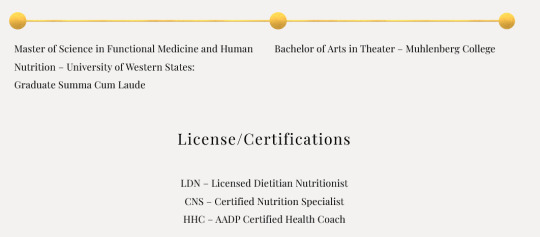
Abra Pappa got her MS in Functional Medicine and Human Nutrition after getting a BA in Theater; I checked the requirements for that degree and the school's whole catalogue is throwing red flags but what's throwing the most red flags for me is that if I wanted to get a degree in nutrition from an ACEND accredited program I'd need to take a hell of a lot more than one bio class, one anatomy OR one physiology class, one medical terminology class, one nutrition class, and one biochemistry class in order to get into a master's program.
It's funny because she went from a BA in theater arts to an MS in Functional Nutrition and Human Nutrition and I've been trying to go from a BA in Theater Arts to an MS in nutrition and *aside* from the whole private school costs thing one of the major barriers is that I'd basically need to re-do all of my undergrad to get in a lot of chemistry, some calculus, and MANY nutrition classes before I qualified for a Master's program. But based on the program she took I'm only one medical terminology and one biochemistry class away from a Master's program instead of more like ten to fifteen classes (primarily in nutrition, chemistry, and physiology) away.
Anyway she says she's a Licensed Dietician Nutritionist. There are some states that allow LDN certification, New York is one of those states. *BUT* to be an LDN in New York you have to
Complete a program in dietetics-nutrition that culminates in a bachelor’s degree that qualifies for certification in dietetics-nutrition or has been accredited by the Commission on Accreditation for Dietetics Education (CADE).[Note: CADE is now ACEND] The program must include at least 45 semester hours of coursework in dietetics/nutrition and must include at least 20 semester hours of coursework in the area of human biological sciences and social and behavioral sciences
Pappa went to the University of Western States in Oregon, and the only ACEND accredited school in Oregon is at OSU, so if she's an LDN it's from someplace that isn't New York, where she lives and works.
She also claims to be a CNS, a Certified Nutrition Specialist, but in order to qualify for THAT you need to have an MS with some pretty rigorous coursework
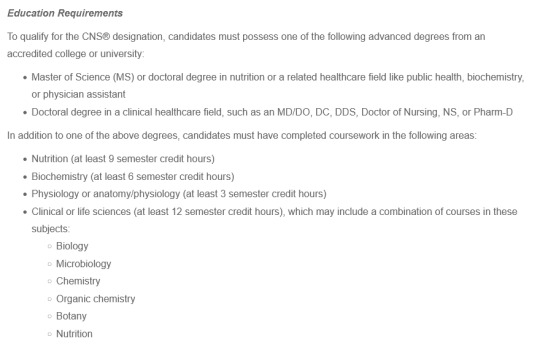
And this is what the school required for her MS program:
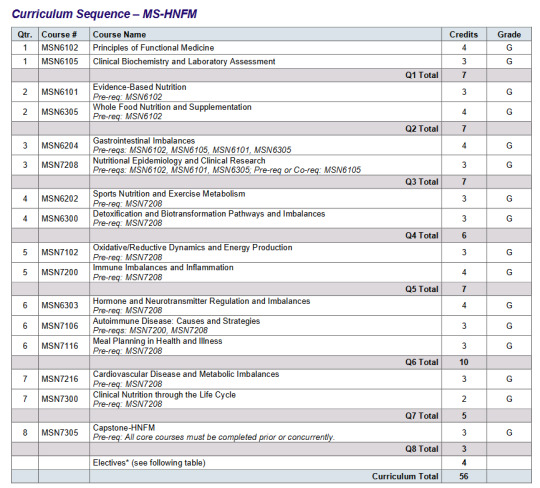
And given that she didn't have a science degree for undergrad it seems pretty likely that she wasn't doing anything close to what an undergrad nutrition program looks like:

For the record, here are the MS requirements for an MS in nutrition with a health and wellness emphasis at that same school:
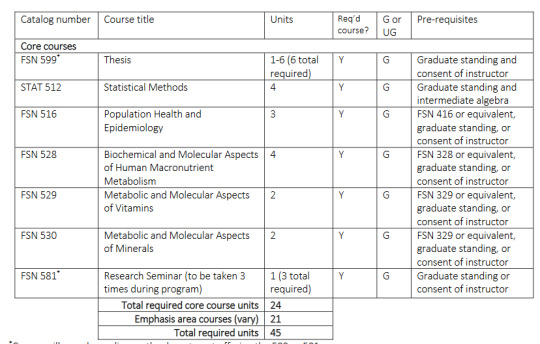
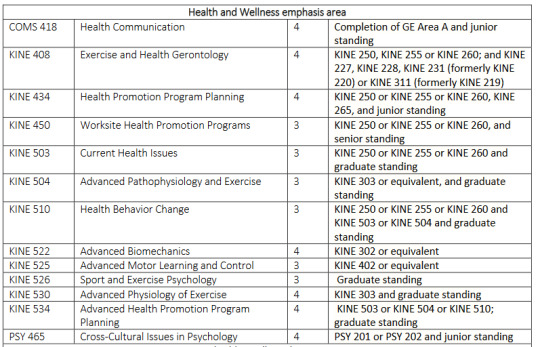
In order to get accepted to the MS in nutrition program in that school you either need to have a BS in nutrition or a BS in biology or chemistry and take all the undergrad level nutrition requirements ON TOP OF that BS.
I don't think that a theater degree and an MS from a woo-y correspondence school really count, even if you do pay $45k for your diploma.
If you go look at the requirements for any ACEND accredited school and compare them to the MS program from University of Western States it leaves UWS looking pretty shitty in comparison. Like, nowhere in her requirements is there a statistics class! Stats is required even for an associate transfer certificate in nutrition! EVEN AT THE 2-YEAR LEVEL FOR REAL NUTRITION DEGREES YOU HAVE TO DO STATS AND SHE DIDN'T HAVE TO TAKE A SINGLE STATS CLASS FOR HER MS. You will note that the cal poly MS program has one entire MS-Level class on vitamin metabolism and one entire MS-Level class on mineral metabolism for any of the three MS in Nutrition emphasis courses; her school required neither.
This shit makes me want to climb the walls.
I'm just going to start calling myself a nutritionist. California will let anyone call themselves a nutritionist, there are absolutely zero protections on that term and I can get myself a piece of paper for like three hundred dollars from a diploma mill that has some kind of bullshit accreditation.
Here are the programmatic accreditations her school has:
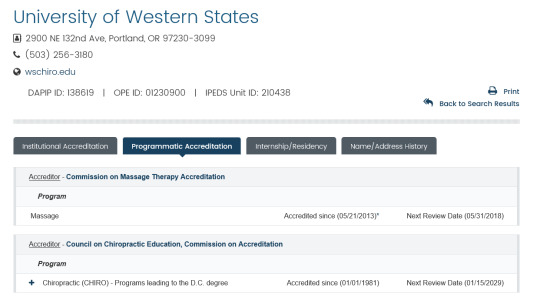
Compare with the Cal Poly programmatic accreditations (I cite cal poly a bunch because it was the program I was hoping to get into eventually so I researched it the most; that's where I got my BA, go broncos):
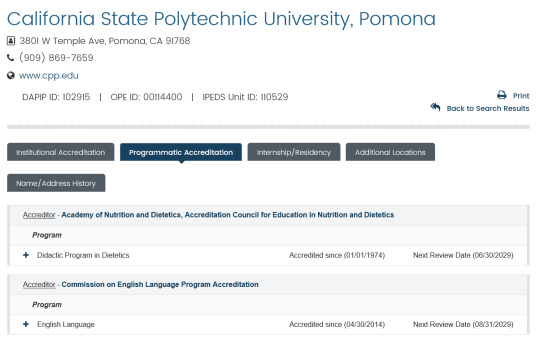
Note that the website for her school is listed with the department of education as wschiro.com because it was called Western States Chiropractic College until 2010.
Every time i dig into something like this it makes me want to stare into space for hours. No wonder college students are getting fucked on their loans and going to bullshit schools. No wonder everything is a scam these days. People bitch about credentialism but you know what maybe this lady is a CNS; sure, for some people that requires passing board certification tests, getting 1000 hours of clinical supervision, and becoming a Nurse Practitioner with real actual nutrition study from a solid program, but for other people it requires zero understanding of statistics, a theater degree, and three *whole* units of anatomy. Maybe she clears the bar on that one! She doesn't have the qualifications for an LDN in New York, she's not an RDN because she sure as fuck didn't take the classes required for a *VERY SERIOUSLY* protected title, but maybe you can be a CNS with an online diploma from the western states chiropractic college.
I fucking hate everything.
You know the whole reason I wanted to get a degree in nutrition was to yell about shit like this online, but fuck it. Fuck it, I'm a nutrition-isht because i live in california and I can say I am and who's going to check? Who's going to look up whether I took classes in public health or anatomy or the metabolism of micronutrients before they hire me to do corporate seminars on healing your relationship to food? I am legally allowed to do that so I might as well, right? If all I have to do is be charismatic and convincing I'm pretty sure I've got that down, actually, so who's going to check?
Nobody! Nobody is going to check and everything is a scam and I hate everything.
ANYWAY
The relationship between nutrition and inflammation and the relationship between chronic disease and inflammation are two different, complicated things that are difficult to point at and say definitively what the connections are.
I am of the opinion that any time you're getting deep into things like an anti-inflammatory, ketogenic, or PH-Balancing diet without a specific condition that calls for the avoidance of certain foods for very clearly scientifically reported reasons, you're dealing with a woo-woo biohacker who's looking to sell a diet plan.
The thing about nutrition science is that it seems like for most people the "answers" are pretty basic: eat enough food, get enough macro and micronutrients, eat a variety of food, avoid processed meats, try to eat more fruits and vegetables, get enough water, and stay as active as possible NOT for weight loss reasons but for metabolic health and joint/muscle maintenance. It's really, really, hard to sell that though, which is how you get people like Abra Pappa in 2013 writing out this bugfuck "Food and mood" handout with a midday snack that is so bonkers in the way the calories are distributed that I'm sitting down and doing math about it (it looks like about a third of the calories that day are supposed to come from the mid afternoon spinach, mint, cocoa nib, and coconut milk smoothie which is, as I said, bugfuck nuts).
It's hard to sell "please eat more fruits and vegetables, which is difficult because actually most places don't grow enough vegetables for the population's nutrition needs and it's cheaper to eat grains and industrially produced meat than it is to eat five cups of vegetables that you need to prepare daily and also maybe skip the bacon" but it's much easier to sell "five anti-inflammatory superfood milkshakes that will fill your belly and fight cancer" because it's packaging nutrition as a product and not as a massive systemic issue that happens to have very specific requirements for a large number of individuals who *do* happen to have disorders that are based on nutrition and inflammation (celiac disease! I've got one of them! Eating the wrong foods definitely causes inflammation in my body as the result of an autoimmune disorder! but that doesn't mean that the things that are inflammatory for me are inflammatory for everyone!)
Anyway I think like about 97% of workplace wellness programs are largely bullshit based, or at least import bullshit a lot of the time, and nutrition is a science that has, just, so much bullshit in and around it.
So I would take anything they say with a grain of salt, and hopefully less than 255% of your RDV of saturated fat (seriously that meal plan is ludicrous).
Side note: there is a subset of nutrition people who looked at the way that we got fat wrong in the 80s and flipped it and reversed it and went "actually you can have as much fat of any kind that you want as long as it is natural and you will have no issues" and this is how you end up with people on 100% natural clean keto diets who have cholesterol levels over 600. Abra Pappa recommends "clean/natural" eating and has taken continuing education on keto and has a recipe for a single-serving smoothie that calls for 8oz of coconut milk I think she's very much in the "'good' fat truther" camp (or at least she was in 2013 which is maybe why New York has a requirement for people to have some kind of nutrition certification for giving out nutrition advice and maybe she should have done that because she didn't even go to her bullshit "grad school" until 2017).
(We DID get fat wrong in the 80s and total avoidance of all fats is bad for you and there are 'good' fats that you should eat and everybody needs to eat some level of fat for proper nutrient absorption but even if you're only getting fat from nuts and avocados that's not going to prevent your arteries from forming plaques if you're having nearly triple the recommended daily value of saturated fat as part of your afternoon snack)
282 notes
·
View notes
Text
Understanding Psychoeducational Assessment in Ontario
In the realm of education, understanding the unique needs of each student is paramount to their success. This understanding often begins with a comprehensive assessment, especially for those who may face learning challenges or differences. In Ontario, Canada, psychoeducational assessment plays a crucial role in identifying these needs and providing tailored support. This blog explores the significance, process, and benefits of psychoeducational assessment within the Ontario education system.
Understanding Psychoeducational Assessment:
Psychoeducational Assessment Ontario is a particular assessment led via prepared experts to figure out a person’s mental, scholarly, social, and profound working.In Ontario, this assessment is particularly relevant for students who may experience difficulties in learning or behavior within an educational setting. These difficulties can range from learning disabilities and attention disorders to emotional disturbances and developmental delays.

The Process:
The process of psychoeducational assessment typically begins with a referral from a teacher, parent, or school administrator who has observed persistent challenges in a student’s academic or behavioral performance. Once the referral is made, a qualified psychologist or psychoeducational consultant conducts a series of standardized tests and assessments to gather comprehensive data about the student’s abilities, strengths, and areas of need.
These assessments may include:
Cognitive assessments: These tests evaluate intellectual functioning, problem-solving abilities, memory, and reasoning skills.
Academic assessments: These tests assess the student’s proficiency in reading, writing, mathematics, and other academic domains.
Behavioral assessments: These assessments examine the student’s behavior, social skills, emotional regulation, and overall adjustment within the school environment.
Additional assessments: Depending on the student’s specific concerns, additional assessments may be conducted to explore areas such as attention, executive functioning, and sensory processing.
Once the assessments are complete, the psychologist or consultant analyzes the data to identify any areas of concern or discrepancy between the student’s abilities and expectations for their age and grade level.
Benefits of Psychoeducational Assessment:
Psychoeducational assessment offers numerous benefits for students, parents, educators, and schools:
Individualized Support: By identifying a student’s specific strengths and challenges, psychoeducational assessment enables educators to tailor interventions and supports to meet their unique needs.
Early Intervention: Early identification of learning difficulties or developmental delays allows for timely intervention and support, minimizing academic and social-emotional setbacks.
Improved Academic Outcomes: With targeted interventions and accommodations, students can experience increased academic success and confidence in their abilities.
Enhanced Self-awareness: Psychoeducational Assessment Ontario provides valuable insights into a student’s learning style, preferences, and areas for growth, fostering self-awareness and self-advocacy skills.

Collaboration and Communication: Assessment results facilitate collaboration between educators, parents, and support professionals, fostering a team approach to student success.
Access to Resources: Assessment findings may qualify students for additional supports, services, or accommodations under Ontario’s education system, ensuring equitable access to resources.
Evidence-based Decision Making: Educators and school administrators can make informed decisions about educational programming, placement, and resource allocation based on objective assessment data.
Conclusion:
In Ontario, psychoeducational assessment serves as a cornerstone of the education system, guiding interventions, supports, and resource allocation to meet the diverse needs of students. By understanding each student’s unique profile of strengths and challenges, educators and support professionals can unlock their full potential and promote academic success, emotional well-being, and lifelong learning. Through collaboration, early intervention, and evidence-based practices, psychoeducational assessment empowers students to thrive in school and beyond, laying the foundation for a brighter future.
#Psychoeducational Assessment Ontario#Psychological Assessment Ontario#ADHD assessment Ontario#Mental Health Services Ontario#Cognitive Behavioral Therapy Online#Cognitive Behavioral Therapy Ontario
0 notes